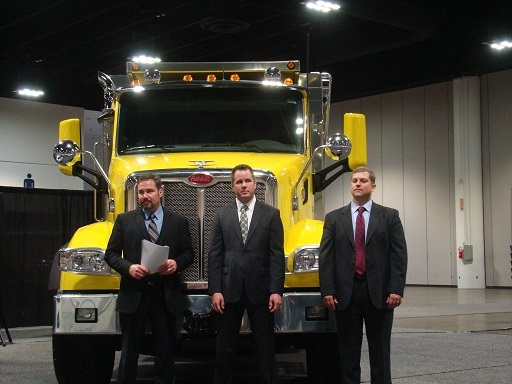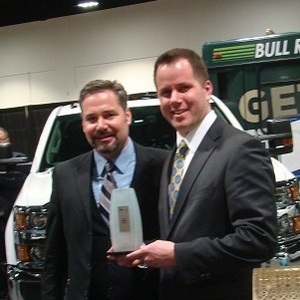Peterbilt, Kenworth truck maker PACCAR approves B20 use



Photo: Ron Kotrba, Biodiesel Magazine
January 26, 2016
BY The National Biodiesel Board
More than 100,000 trucks join renewable fuel ranks as PACCAR embraces biodiesel blends in its engines, old and new. Considering average mileage, these trucks alone have the potential to run 12 billion miles annually, and they are just the tip of the biodiesel vehicle population.
Addressing an enthusiastic audience at the Biodiesel Conference & Expo, National Biodiesel Board CEO Joe Jobe said, “PACCAR’s support underlines that biodiesel is the single best carbon mitigation strategy out there; with widespread support across all diesel applications, we are perfectly positioned to deliver even more cleaner burning biodiesel into the marketplace. The U.S. biodiesel industry has invested over 20 years of research and development activity to provide the highest quality biodiesel fuel for the marketplace, and today we recognize PACCAR for taking the initiative to endorse B20 biodiesel blends for use in your equipment.”
Although vehicle manufacturers don’t warranty fuel, rather just their own parts and workmanship, from coast to coast nearly all now formally support B20 (20 percent biodiesel). More than 78 percent of the diesel vehicles coming off production lines today are approved for use with B20. Notably all of Detroit’s Big Three Automakers—Ford, General Motors and Fiat Chrysler—have supported high biodiesel blends for nearly a decade. Among U.S. heavy-duty truck segments, which account for more than 87 percent of actual diesel fuel usage, every major engine manufacturer supports B20 in their new engines except for Daimler’s Detroit Diesel, which remains at B5.
Advertisement
Jobe presented PACCAR with the prestigious Eye on Biodiesel “Initiative Award” to recognize their strong support. Specifically, the new PACCAR MX-11 engine and all model years of its MX-13 engine, both legacy models and new equipment, are now approved for use with B20. PACCAR diesel engines are sold in heavy-duty trucks under the Kenworth and Peterbilt nameplates in North America. Peterbilt and Kenworth already support B20 in their medium duty truck models (PX-7 and PX-9 engine equipped), and PACCAR’s latest change means there are now a total of nearly 1 million Peterbilt and Kenworth medium- and heavy-duty trucks approved for running cleaner and greener B20 biodiesel blends.
Landon Sproull, PACCAR assistant vice president, said, “PACCAR is pleased to earn the Eye on Biodiesel Award while we are expanding PACCAR’s engine line of B20-compatible engines. Our new B20-compatible PACCAR MX-11 engine is available in Peterbilt and Kenworth trucks beginning in January 2016, joining our highly successful MX-13 engine. PACCAR designs and builds the most durable, fuel-efficient and highest quality heavy-duty truck engines in the world, and PACCAR engines perform well using a variety of fuel sources. Increasing our support level from B5 to B20 biodiesel blends provides more choice and value to PACCAR’s customers.”
Advertisement
The award was presented at the 2016 National Biodiesel Conference during the Biodiesel Vehicle Showcase event, featuring B20-approved models from PACCAR/Peterbilt, Hino Trucks, Cummins, General Motors and more.
Many users are realizing that B20 biodiesel blends offer them a cost-effective and seamless option to help meet aggressive new greenhouse gas and carbon reduction goals, and thus are increasing their use of biodiesel blends. Customer preferences play a strong role in influencing vehicle manufacturers, as a growing number of fleets and individual customers expect—or demand—that the vehicles and equipment they purchase be compatible with B20.
National Biodiesel Conference attendees will be putting some of the latest diesel vehicle models to the test on Wednesday, Jan. 27 during the 2016 Biodiesel Ride-and-Drive Event outside the Tampa Convention Center from 12:30-3:30 p.m. As Wednesday is also Public Day at the National Biodiesel Conference, Florida residents are encouraged to join conference attendees in checking out the power and performance of biodiesel in today’s new technology diesel vehicles during this event.
Made from an increasingly diverse mix of resources such as recycled cooking oil, soybean oil and animal fats, biodiesel is a renewable, clean-burning diesel replacement used in existing diesel engines. It is the first and only commercial-scale fuel produced across the U.S. to meet the EPA’s definition as an advanced biofuel—meaning the EPA has determined that it reduces greenhouse gas emissions by more than 50 percent when compared with petroleum diesel.
Related Stories
A small but increasing amount of biodiesel in the United States is consumed in the residential, commercial, and electric power sectors, according to new estimates now published in the U.S. EIA’s State Energy Data System.
IAG and Microsoft are extending their 2023 co-funded purchase agreement for SAF by five years. The SAF used under the agreement will be produced by Phillips 66’s Humberside refinery and LanzaJet’s facility in the U.S.
Neste and DB Schenker, a logistics service provider, have collaborated to work towards expanding DB Schenker’s adoption of Neste MY Renewable Diesel in Asia-Pacific. DB Schenker trialed the fuel from December 2024 to February 2025 in Singapore.
Effective April 1, Illinois’ biodiesel blend requirements have increased from B14 to B17. The increase was implemented via a bipartisan bill passed in 2022, according to the Iowa Soybean Association.
Airbus is taking a significant step toward scaling the adoption of sustainable aviation fuel (SAF) by testing a new “Book and Claim” approach. This initiative aims to boost both supply and demand for SAF worldwide.
Upcoming Events










